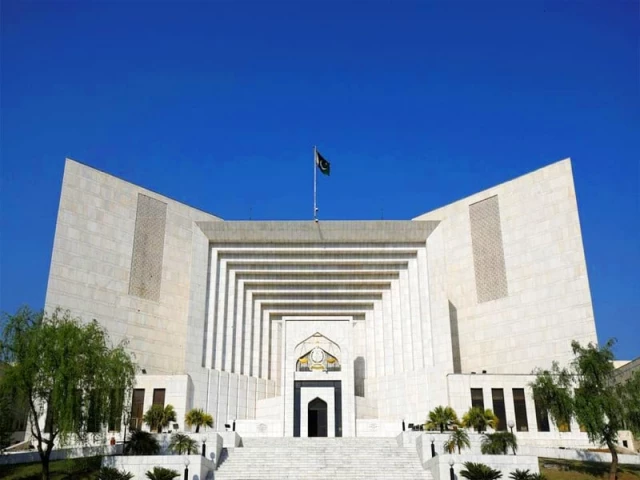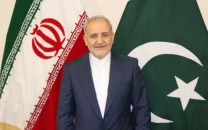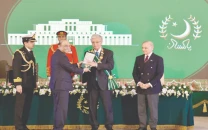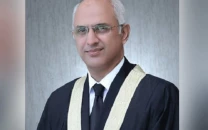SC rules on high court chief justice's duties
CJP Afridi says inaction on executive interference violates Article 203.

The Supreme Court has ruled that any inaction on part of a chief justice of the high court in response to a complaint of a judicial officer regarding the interference of executive agencies would be contrary to his constitutional obligations under Article 203 of the Constitution.
"The Chief Justice of the Lahore High Court: firstly, acted within his constitutional authority under Article 203 to supervise the proceedings of subordinate courts, including the Anti-Terrorism Courts; and secondly, in light of the dismissal of the reference against the Presiding Judge by the Administrative Judge due to insufficient grounds, the Chief Justice was also fully justified in not taking further action on the transfer application, which lacked merit and was based solely on a reference that lacked compelling evidence.
"We are mindful of the fact that the Chief Justice of a High Court in a province is the paterfamilias of the judiciary within that province. Therefore, any inaction on his part in response to any such like complaint of a judicial officer would be contrary to his constitutional obligations under Article 203 of the Constitution," a four-page judgement authored by Chief Justice of Pakistan (CJP) Yahya Afridi read while hearing a petition filed by Punjab Prosecution Department against the order of then chief justice Lahore High Court (LHC) on applications moved by the state seeking transfer of cases from one presiding judge of the anti-terrorism court (ATC) to another.
The main thrust of the special prosecutor representing the state was that findings recorded in paras 8 and 9 of the orders were not only uncalled for but also beyond mandate of authority vested in the chief justice.
It is to be noted that former LHC CJ Malik Shahzad Ahmad Khan had taken position against the executive agencies interference in ATC judges affairs.
He even took strong exception to the Punjab government's request to transfer the ATC Rawalpindi judge. The Punjab government was reluctant to appoint those ATCs judges who were recommended by ex-LHC chief justice.
He had referred complaint of ex-ATC judge Sargodha to the apex court which was hearing suo motu cases on six Islamabad High Court judges letter against the interference of agencies in their judicial functions.
In the meanwhile, the government with the help of ex-CJP Qazi Faez Isa was able to elevate Malik Shahzad Ahmad Khan to the apex court. Four Supreme Court judges were not in favor of his elevation to the apex court as they believed the Punjab judiciary needed a strong administrative head.
Unlike ex-LHC CJ, former Islamabad High Court chief justice was unable to take action on the complaints of judges regarding executive interference.
A three-judge bench of the apex court led by CJP Afridi in its written order said it is essential to recognize the special supervisory authority vested in the chief justice of a high Court under Article 203 of the Constitution.
"Essentially, Article 203 of the Constitution entrusts the Chief Justice, as the administrative head of a High Court, with the responsibility to supervise and regulate the proceedings of all subordinate courts within the province, including the Anti-Terrorism Courts. Applying this constitutional mandate to the present cases, it is our view that the Chief Justice of the Lahore High Court, in his administrative capacity, was not only empowered to address the issue at hand with his discretion, but also duty-bound to protect the Presiding Judges of the District Judiciary from any undue executive influence," the order said.
The court noted that the reference brought by the state against the presiding judge of the ATC, alleging bias, was duly considered by the administrative judge.
"After taking into consideration both the allegations and the response of the Presiding Judge, the Administrative Judge decided to file the reference, but ultimately dismissed it, indicating that there were insufficient grounds to proceed further.
"Following this, the transfer application was filed, based solely on the fact that a reference had been made, despite no convincing evidence being presented to substantiate the allegations. This sequence reinforces the conclusion that the transfer request lacked sufficient merit to justify further action," the order said.
"We have also been informed by the learned Special Prosecutor representing the State that Presiding Judges of the Anti-Terrorism Courts, whose bias had been questioned by the State, have since been transferred.
"As such, there remains no live issue for immediate consideration. However, the State continues to be aggrieved particularly by the findings recorded in paras. 8 and 9 of the impugned orders, the costs imposed, and the referral of the matter for consideration of this Court in Suo Moto Case No. 1 of 2024, as recorded therein," the order read.
"To our mind, the challenged action of the Chief Justice being essentially administrative in nature, and that too, relating to managing and supervising the subordinates under the constitutional mandate envisaged under Article 203 of the Constitution, ought not to be disturbed, lest the same are blatantly unreasonable, capricious or arbitrary, which are not apparent in the circumstances of the present cases," it added.
The court also observed that the findings recorded in paras. 8 and 9 of the impugned orders, concerning the professional conduct of the judicial officers and state functionaries, appear to be somewhat personal in nature.
"While, mindful of the gravity of the observations made, we are of the view that judicial propriety necessitates circumspection, particularly, when commenting on the conduct of executive and judicial functionaries and all the more without due inquiry. Hence, we deem it necessary to clarify that such remarks, whether favourable or adverse, must not be seen as having any binding effect in future proceedings. The praise directed towards judicial officers should not be construed as a shield that protects them from legitimate scrutiny, nor should the critical remarks regarding state functionaries, particularly the Prosecutor General, be treated as a sword to prejudice or undermine their future conduct. In essence, these observations are not to be regarded as determinative or conclusive in any subsequent forum and any future assessment of their conduct should be made independently, on its own merits, strictly in accordance with the law," the order said.
























COMMENTS
Comments are moderated and generally will be posted if they are on-topic and not abusive.
For more information, please see our Comments FAQ